
How to Maintain Your Car for Longevity and Performance
Regular car maintenance is essential for keeping your vehicle running smoothly and extending its lifespan. Proper upkeep ensures safety, improves fuel efficiency, and prevents costly repairs. Here are some key tips on how to maintain your car effectively.
Regular Oil Changes
Engine oil lubricates moving parts and prevents wear and tear. Follow the manufacturer’s recommended schedule for oil changes and check the oil level periodically. Neglecting oil changes can lead to engine overheating, increased friction, and even permanent damage. Always use the correct type of oil as specified in your owner’s manual, and be sure to replace the oil filter with each oil change to keep contaminants from circulating through the engine.
Monitor Tire Pressure and Tread Depth
Your car’s tires are crucial for safety, performance, and fuel efficiency. Properly inflated tires improve handling and reduce the risk of blowouts. Under-inflated tires can decrease fuel economy and increase tire wear, while over-inflated tires can compromise grip and ride comfort. Check your tire pressure at least once a month and before long trips. In addition, inspect tread depth to ensure adequate traction—balding tires can be extremely dangerous, especially in wet or icy conditions. Rotate your tires every 5,000 to 7,500 miles to ensure even wear, and replace them when necessary.
Inspect Brakes and Brake Fluid
Your braking system is one of the most critical safety features of your car. If you hear squeaking or grinding noises, it may indicate that your brake pads are worn and need to be replaced. Additionally, check the brake fluid levels regularly and make sure there are no leaks. Old or contaminated brake fluid can cause a spongy brake pedal and reduced braking efficiency. Bleeding the brakes and replacing the fluid as needed will help maintain responsive braking performance.
Keep the Battery in Good Condition
A dead battery can leave you stranded at the worst possible time. To avoid this, check the battery terminals for corrosion and clean them as needed. Ensure the battery is securely fastened, as excessive vibrations can shorten its lifespan. Most car batteries last between three to five years, so if yours is getting old, consider replacing it before it fails unexpectedly. If you frequently make short trips, your battery may not get fully charged, so an occasional long drive or trickle charger can help maintain battery health.
Replace Air and Fuel Filters
Air and fuel filters play a crucial role in engine performance. A clogged air filter can restrict airflow to the engine, reducing efficiency and power. Replacing your air filter according to the manufacturer’s schedule—typically every 12,000 to 15,000 miles—will help maintain optimal performance. Similarly, a clogged fuel filter can lead to engine hesitation, stalling, or reduced fuel economy. Changing the fuel filter as recommended helps keep the fuel system clean and running efficiently.
Maintain Fluid Levels
Your car relies on various fluids to function properly, including coolant, transmission fluid, power steering fluid, and windshield washer fluid. Low or contaminated coolant can cause engine overheating, which can lead to costly repairs. Transmission fluid should be checked regularly and changed as needed to ensure smooth gear shifts. Power steering fluid keeps the steering responsive and should be topped off as necessary. Keeping all these fluids at the proper levels will prevent breakdowns and prolong your vehicle’s life.
Follow a Regular Service Schedule
Your car’s manufacturer provides a recommended maintenance schedule that includes necessary service intervals for different components. Sticking to this schedule helps prevent major mechanical issues and keeps your vehicle in top condition. This can include tune-ups, spark plug replacements, timing belt changes, and more. Ignoring scheduled maintenance can lead to costly breakdowns and decrease the overall lifespan of your vehicle.
Keep the Exterior and Interior Clean
Regular washing and waxing protect your car’s paint from dirt, debris, and harsh weather conditions. Waxing also helps prevent rust from forming, which can significantly impact the vehicle’s longevity. The interior should also be cleaned regularly to prevent wear and tear on upholstery and controls. Using seat covers and floor mats can help keep your car’s interior looking new, while vacuuming and conditioning leather or fabric seats will extend their lifespan.
Address Warning Lights Immediately
Modern vehicles come equipped with a range of warning lights to alert you to potential issues. If a warning light comes on, don’t ignore it—addressing problems early can prevent expensive repairs down the road. Whether it’s the check engine light, oil pressure warning, or tire pressure indicator, diagnosing and fixing the issue promptly can save you from further damage.
Drive Responsibly
Your driving habits directly impact your car’s longevity. Aggressive driving, sudden stops, and rapid acceleration put unnecessary strain on the engine, brakes, and transmission. Maintaining a steady speed, easing into stops, and avoiding excessive idling can all help extend your car’s lifespan. Additionally, warming up your car in cold weather before driving off can prevent damage to the engine and transmission components.
Store Your Car Properly
If you plan to leave your car unused for an extended period, proper storage is essential. Keep it in a garage or use a car cover to protect it from the elements. Fill the gas tank to prevent moisture buildup and use a fuel stabilizer to keep the gasoline from degrading. Disconnect the battery to prevent drainage, and consider placing the car on jack stands to prevent tire flat spots.
By following these essential maintenance tips, you can keep your car in top shape, ensure its longevity, and enjoy a smoother driving experience. Regular upkeep not only enhances performance but also increases resale value, making it a worthwhile investment. Taking a proactive approach to car maintenance can save you thousands in repair costs and keep your vehicle reliable for years to come.






Leave a Reply